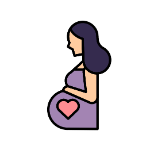
Miscarriage
Everything You Need To Know About Miscarriage
10 min | Updated on 30-03-2023 by HappyPreggie
If you were rejoicing over a positive pregnancy test just weeks ago, coping with a sudden and unexpected miscarriage can be overwhelming. You may feel a range of emotions, from sad and disheartened over the loss to anger and resentful it happened to you. You may even possibly withdraw from your family and friends.
Miscarriage, or pregnancy loss, is an emotional and often traumatic time. In addition to feeling grief over losing your baby, you may have to deal with the physical and relationship impacts of a miscarriage.
While nothing can erase the loss, knowing why it happened, that there's nothing you can do to prevent it, and ways to cope may help you move toward healing and recovery.

Miscarriage is known as the spontaneous loss of a pregnancy before the 20th week. It usually happens in early pregnancy, with 8 out of 10 miscarriages occurring in the first 3 months.
The term 'miscarriage' might suggest that something went wrong when you were pregnant, but this is rarely the case. Most miscarriages occur because the foetus isn't developing as expected.
You may be unaware if you're having a miscarriage because sometimes, it has no symptoms. You may not find out until an ultrasound is done or when you don't feel pregnant anymore. However, in people who have symptoms of a miscarriage, the most common signs are:
Other issues that are less serious than miscarriage can also cause similar symptoms. If you think you’re having a miscarriage, you will want to see the doctor immediately, just to be safe.

Miscarriages are more common than most people think.
Among people who know they're pregnant, about 1 in 8 (10 - 20%) of those pregnancies will end in miscarriage. But the actual number may be higher because many miscarriages happen very early in pregnancy, before you may even know you're pregnant.
However, losing 3 or more miscarriages in a row (recurrent) is rare and may only affect about 1 in 100 women.

The pain and bleeding may resolve, and you will have a healthy pregnancy and baby, but the opposite may also happen. Things may get worse, and you may have a miscarriage.
Unfortunately, there is rarely anything a doctor, midwife, or you can do to prevent a miscarriage. It was recommended in the past to have bed rest, but there is no scientific proof that this method helps when you have reached this stage.
If you have a miscarriage at home or somewhere with no health workers present, it is advisable to have a check-up with a doctor or midwife to ensure the miscarriage is complete.
Your doctor or midwife will assess whether you need a short procedure called a 'dilation of the cervix and curettage of the uterus' (commonly known as D&C) to remove the remaining pregnancy tissue. This important medical procedure can only be done in an operating theatre.
You should discuss the treatment and support options with your doctor if this happens.
Other than the points mentioned above, these types of pregnancies can also lead to miscarriage:

An ectopic pregnancy happens outside the womb, usually in the fallopian tube, affecting around 1 in 90 pregnancies. Unfortunately, there is no way to save an ectopic pregnancy.

A molar pregnancy occurs when there's a problem with the fertilised egg, meaning the baby and the placenta did not develop as they should. The general risk of molar pregnancy is quite rare, affecting only 1 in 600 pregnancies.
Regrettably, a molar pregnancy will not be able to survive, and it may end on its own by miscarriage. If that does not happen, it's usually treated with a procedure to remove the pregnancy.
The most common cause of pregnancy loss, or miscarriage, is the problem with chromosomes that make it impossible for the foeteus to develop normally. Other issues that may play a role include the mother's low or high hormone levels and uncontrolled diabetes.
Most mothers do not ever find out the cause of their miscarriage. However, it is commonly known that miscarriages happen because the baby fails to develop properly due to a spontaneous, not inherited, chromosomal abnormality.
Sometimes, a miscarriage is caused by these reasons:
Also, women are more likely to miscarry if:

Most miscarriages are caused due to genetic abnormalities in the foeteus, and nothing can be done to prevent it.
However, not all miscarriages are caused by genetic abnormalities. If you have had a miscarriage, you will want to work with your doctor to determine the reason for your miscarriage and plan for future pregnancy. A healthy lifestyle before and during pregnancy may help reduce the risk of miscarriage. Here are some tips you can do to lower the chance of miscarriage:
These steps may help to decrease miscarriage possibility, too:
Finding and treating any health conditions before you try to conceive can also help ensure a healthy baby. For example, if your previous miscarriage was due to an autoimmune response or hormonal imbalances, you may want to seek treatment for it. Once you get pregnant, it is advisable to get early, thorough prenatal care to ensure a healthy pregnancy.

Just as every woman's experience with miscarriage differs, so will the recovery process. Here are some ways to emotionally recover after a pregnancy loss:
a. Understand That Your Feelings Are Normal
Many people might urge you to move on as soon as you have your miscarriage, and they could even think you're overreacting if you are grieving hard. It's also possible that you miscarried before announcing your pregnancy, so your recovery process may be private and silent.
It's been a norm for too long not to discuss miscarriage grief. Consequently, many women don't realise that miscarriage is common; instead, they believe that what they're feeling is wrong.
Feeling grief after a miscarriage is normal and more universal than many of us were taught to believe. Whatever feeling you are experiencing after a miscarriage, it's okay.
b. Let Yourself Feel The Emotions
The power of your emotions after a miscarriage might surprise you, and you might feel the urge to push aside these feelings. But sometimes, the best way to cope with your emotions is to move through them.
Denying, pushing, or running away from the emotions will usually only make you feel worse. Note that sadness may not be the only emotion you might experience after a miscarriage - guilt, anger, shock, and emotional numbness are also common.
c. Memorialise Your Loss
Some women find it healing to memorialise their pregnancy. Depending on how far along you were in your pregnancy, having some kind of burial may be possible.
You may also gather a few loved ones to have a grieving ceremony. You can plant a tree in honour of your lost baby, light a candle, make a scrapbook with special items from the pregnancy or have a piece of jewellery engraved with your baby’s name to memorialise them.

Your doctor may prescribe a painkiller to help you with any cramping. They may also prescribe antibiotics and/or medicine to help the uterus continue contracting to minimise the bleeding.
Most women can resume their normal activities within a day or two after the procedure. Still, you will want to avoid tampons and sexual intercourse for about two weeks to reduce your infection risk.
A miscarriage is a very emotional moment for expectant parents, so it's natural to grieve the loss. Remember that a miscarriage can't be prevented, and it's not caused by something you did wrong. Having a miscarriage doesn't mean you can't have children or that you'll certainly have another miscarriage. If you're planning to try again, consult your doctor to ask any questions you may have. Keep in mind that coping with loss differs for everyone, so allow yourself time and space to grieve. Get support from family, friends, support groups or licensed counsellors to help you express your emotions better.
After a miscarriage, you may refuse to try again due to the fear of another miscarriage. Read our blogs on Top 10 Tips That Will Help You To Conceive and 8 Ways To Overcome Your Birth Fears to help ease your worries.
Miscarriage, or pregnancy loss, is an emotional and often traumatic time. In addition to feeling grief over losing your baby, you may have to deal with the physical and relationship impacts of a miscarriage.
While nothing can erase the loss, knowing why it happened, that there's nothing you can do to prevent it, and ways to cope may help you move toward healing and recovery.
What is a Miscarriage?
(Image credits to CNN)
Miscarriage is known as the spontaneous loss of a pregnancy before the 20th week. It usually happens in early pregnancy, with 8 out of 10 miscarriages occurring in the first 3 months.
The term 'miscarriage' might suggest that something went wrong when you were pregnant, but this is rarely the case. Most miscarriages occur because the foetus isn't developing as expected.
How Do You Know If You’re Having a Miscarriage?
You may be unaware if you're having a miscarriage because sometimes, it has no symptoms. You may not find out until an ultrasound is done or when you don't feel pregnant anymore. However, in people who have symptoms of a miscarriage, the most common signs are:
- Vaginal bleeding or spotting
- Severe belly pain
- Severe cramping
- Mild to severe low backache
- Decrease in pregnancy symptoms
Other issues that are less serious than miscarriage can also cause similar symptoms. If you think you’re having a miscarriage, you will want to see the doctor immediately, just to be safe.
How Common Is A Miscarriage?
(Image credits to Gleneagles Hospital)
Miscarriages are more common than most people think.
Among people who know they're pregnant, about 1 in 8 (10 - 20%) of those pregnancies will end in miscarriage. But the actual number may be higher because many miscarriages happen very early in pregnancy, before you may even know you're pregnant.
However, losing 3 or more miscarriages in a row (recurrent) is rare and may only affect about 1 in 100 women.
What Are The Types of Miscarriage?
(Image credits to BoardsMD)
a. Early miscarriage
Unfortunately, early miscarriages are common. In the first 3 months, 1 in 4 women may have a miscarriage. After the first trimester, the risk of miscarriage will go down significantly.b. Late miscarriage
A late miscarriage happens after the first trimester but before the 24th week and is much less common. They may occur in around 1-2% of pregnancies. After the 24th week, a baby's death before or during labour is called a stillbirth.c. Threatened miscarriage
This condition indicates the potential for a miscarriage or early pregnancy loss and might occur before the 20th week of pregnancy. A threatened miscarriage is when your body is showing signs that you might miscarry, such as light vaginal bleeding or lower abdominal pain. These signs can last for days or weeks.The pain and bleeding may resolve, and you will have a healthy pregnancy and baby, but the opposite may also happen. Things may get worse, and you may have a miscarriage.
Unfortunately, there is rarely anything a doctor, midwife, or you can do to prevent a miscarriage. It was recommended in the past to have bed rest, but there is no scientific proof that this method helps when you have reached this stage.
d. Inevitable miscarriage
Inevitable miscarriage refers to an open internal os in the presence of bleeding in the first trimester of pregnancy. Inevitable miscarriage may come after a threatened miscarriage, or it may also come without warning. There will usually be more vaginal bleeding and severe lower stomach cramps. During the miscarriage, your cervix opens, and the developing foetus comes out in the bleeding.e. Complete miscarriage
A complete miscarriage is when all the pregnancy tissue has left your uterus. Vaginal bleeding may continue for several days. You may also experience cramping pain like during labour or intense period pain as your uterus is contracting to empty itself.If you have a miscarriage at home or somewhere with no health workers present, it is advisable to have a check-up with a doctor or midwife to ensure the miscarriage is complete.
f. Incomplete miscarriage
Sometimes, some pregnancy tissue will remain in the uterus. Vaginal bleeding and lower stomach cramps may prolong as the uterus continues trying to empty itself. This condition is referred to as an incomplete miscarriage.Your doctor or midwife will assess whether you need a short procedure called a 'dilation of the cervix and curettage of the uterus' (commonly known as D&C) to remove the remaining pregnancy tissue. This important medical procedure can only be done in an operating theatre.
g. Missed miscarriage
Missed miscarriage is when the fouteus dies but remains in the uterus. If you experience this miscarriage, you may notice a brownish discharge, and some pregnancy symptoms like nausea and fatigue may fade. However, you may not notice anything unusual and only know of your miscarriage after an ultra scan.You should discuss the treatment and support options with your doctor if this happens.
h. Recurrent miscarriage
A small number of women experience repeated miscarriages. If you have had three or more miscarriages in a row, you may want to consider discussing this with your doctor to investigate the causes, and they may be able to refer you to a specialist.Other than the points mentioned above, these types of pregnancies can also lead to miscarriage:
a. Ectopic pregnancy
(Image credits to Verywell Family)
An ectopic pregnancy happens outside the womb, usually in the fallopian tube, affecting around 1 in 90 pregnancies. Unfortunately, there is no way to save an ectopic pregnancy.
b. Molar pregnancy
(Image credits to MomJunction)
A molar pregnancy occurs when there's a problem with the fertilised egg, meaning the baby and the placenta did not develop as they should. The general risk of molar pregnancy is quite rare, affecting only 1 in 600 pregnancies.
Regrettably, a molar pregnancy will not be able to survive, and it may end on its own by miscarriage. If that does not happen, it's usually treated with a procedure to remove the pregnancy.
What Are The Causes of Miscarriage?
The most common cause of pregnancy loss, or miscarriage, is the problem with chromosomes that make it impossible for the foeteus to develop normally. Other issues that may play a role include the mother's low or high hormone levels and uncontrolled diabetes.
Why do miscarriages happen?
Many women wonder if the miscarriage was their fault. In most cases, miscarriage has nothing to do with anything you have or have not done. There's no evidence that exercising, stress, working, or having sex can cause a miscarriage.Most mothers do not ever find out the cause of their miscarriage. However, it is commonly known that miscarriages happen because the baby fails to develop properly due to a spontaneous, not inherited, chromosomal abnormality.
Sometimes, a miscarriage is caused by these reasons:
- hormonal abnormalities
- immune system and blood clotting problems
- medical conditions such as thyroid problems, diabetes, or PCOS
- severe infections causing high fevers (not common colds)
- physical problems with the womb or cervix
Also, women are more likely to miscarry if:
- they have advanced maternal age
- smoke
- drink alcohol in the first trimester
- drink too much caffeine in coffee, tea, or energy drinks
- have had several previous miscarriages
Can You Prevent A Miscarriage?
(Image credits to Pexels)
Most miscarriages are caused due to genetic abnormalities in the foeteus, and nothing can be done to prevent it.
However, not all miscarriages are caused by genetic abnormalities. If you have had a miscarriage, you will want to work with your doctor to determine the reason for your miscarriage and plan for future pregnancy. A healthy lifestyle before and during pregnancy may help reduce the risk of miscarriage. Here are some tips you can do to lower the chance of miscarriage:
- Take at least 400 mcg of folic acid every day, at least one to two months before conception, if possible.
- Exercise regularly.
- Eat healthy, well-balanced meals.
- Manage your stress.
- Keep your weight within the normal BMI.
- Don't smoke, and stay away from secondhand smoke.
- Don't drink alcohol or have more than one to two cups of caffeinated beverages daily.
- Avoid illicit drugs.
- Make sure you are up to date on immunizations.
These steps may help to decrease miscarriage possibility, too:
- Avoid radiation and poisons such as arsenic, lead, formaldehyde, benzene, and ethylene oxide.
- Take special care to keep your abdomen safe while pregnant. Avoid sports with a higher risk for injuries, such as contact sports and skiing, and always wear your seat belt.
- Check with healthcare professionals before taking any medication, including over-the-counter drugs, during pregnancy.
- Avoid environmental hazards such as X-rays and infectious diseases.
Finding and treating any health conditions before you try to conceive can also help ensure a healthy baby. For example, if your previous miscarriage was due to an autoimmune response or hormonal imbalances, you may want to seek treatment for it. Once you get pregnant, it is advisable to get early, thorough prenatal care to ensure a healthy pregnancy.
How To Cope After A Miscarriage
Emotionally
(Image credits to Discovery Magazine)
Just as every woman's experience with miscarriage differs, so will the recovery process. Here are some ways to emotionally recover after a pregnancy loss:
a. Understand That Your Feelings Are Normal
Many people might urge you to move on as soon as you have your miscarriage, and they could even think you're overreacting if you are grieving hard. It's also possible that you miscarried before announcing your pregnancy, so your recovery process may be private and silent.
It's been a norm for too long not to discuss miscarriage grief. Consequently, many women don't realise that miscarriage is common; instead, they believe that what they're feeling is wrong.
Feeling grief after a miscarriage is normal and more universal than many of us were taught to believe. Whatever feeling you are experiencing after a miscarriage, it's okay.
b. Let Yourself Feel The Emotions
The power of your emotions after a miscarriage might surprise you, and you might feel the urge to push aside these feelings. But sometimes, the best way to cope with your emotions is to move through them.
Denying, pushing, or running away from the emotions will usually only make you feel worse. Note that sadness may not be the only emotion you might experience after a miscarriage - guilt, anger, shock, and emotional numbness are also common.
c. Memorialise Your Loss
Some women find it healing to memorialise their pregnancy. Depending on how far along you were in your pregnancy, having some kind of burial may be possible.
You may also gather a few loved ones to have a grieving ceremony. You can plant a tree in honour of your lost baby, light a candle, make a scrapbook with special items from the pregnancy or have a piece of jewellery engraved with your baby’s name to memorialise them.
Physically
(Image credits to The Conversation)
Your doctor may prescribe a painkiller to help you with any cramping. They may also prescribe antibiotics and/or medicine to help the uterus continue contracting to minimise the bleeding.
Most women can resume their normal activities within a day or two after the procedure. Still, you will want to avoid tampons and sexual intercourse for about two weeks to reduce your infection risk.
A miscarriage is a very emotional moment for expectant parents, so it's natural to grieve the loss. Remember that a miscarriage can't be prevented, and it's not caused by something you did wrong. Having a miscarriage doesn't mean you can't have children or that you'll certainly have another miscarriage. If you're planning to try again, consult your doctor to ask any questions you may have. Keep in mind that coping with loss differs for everyone, so allow yourself time and space to grieve. Get support from family, friends, support groups or licensed counsellors to help you express your emotions better.
After a miscarriage, you may refuse to try again due to the fear of another miscarriage. Read our blogs on Top 10 Tips That Will Help You To Conceive and 8 Ways To Overcome Your Birth Fears to help ease your worries.
Join the largest support network for family health and well-being. Ready to get started?
Get started
















